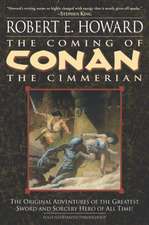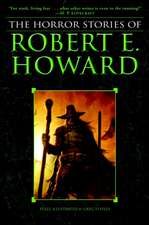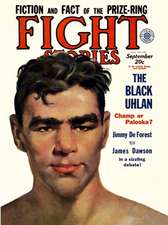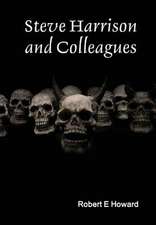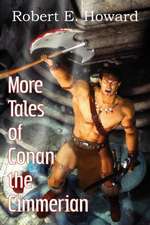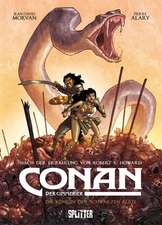The Savage Tales of Solomon Kane
Autor Robert E. Howard Ilustrat de Gary Giannien Limba Engleză Paperback – 31 mai 2004
With Conan the Cimmerian, Robert E. Howard created more than the greatest action hero of the twentieth century—he also launched a genre that came to be known as sword and sorcery. But Conan wasn’t the first archetypal
adventurer to spring from Howard’s fertile imagination.
“He was . . . a strange blending of Puritan and Cavalier, with a touch of the ancient philosopher, and more than a touch of the pagan. . . . A hunger in his soul drove him on and on, an urge to right all wrongs, protect all weaker things. . . . Wayward and restless as the wind, he was consistent in only one respect—he was true to his ideals of justice and right. Such was Solomon Kane.”
Collected in this volume, lavishly illustrated by award-winning artist Gary Gianni, are all of the stories and poems that make up the thrilling saga of the dour and deadly Puritan, Solomon Kane. Together they constitute a sprawling epic of weird fantasy adventure that stretches from sixteenth-century England to remote African jungles where no white man has set foot. Here are shudder-inducing tales of vengeful ghosts and bloodthirsty demons, of dark sorceries wielded by evil men and women, all opposed by a grim avenger armed with a fanatic’s faith and a warrior’s savage heart.
This edition also features exclusive story fragments, a biography of Howard by scholar Rusty Burke, and “In Memoriam,” H. P. Lovecraft’s moving tribute to his friend and fellow literary genius.
Preț: 106.59 lei
Nou
20.40€ • 21.81$ • 17.01£
Carte disponibilă
Livrare economică 27 martie-10 aprilie
Livrare express 12-18 martie pentru 34.28 lei
Specificații
ISBN-10: 0345461509
Pagini: 414
Dimensiuni: 155 x 233 x 23 mm
Greutate: 0.59 kg
Ediția:American.
Editura: Del Rey Books
Extras
He told how murderers walk the earth
Beneath the curse of Cain,
With crimson clouds before their eyes
And flames about their brain:
For blood has left upon their souls
Its everlasting stain.
Hood
I
There are two roads to Torkertown. One, the shorter and more direct route, leads across a barren upland moor, and the other, which is much longer, winds its tortuous way in and out among the hummocks and quagmires of the swamps, skirting the low hills to the east. It was a dangerous and tedious trail; so Solomon Kane halted in amazement when a breathless youth from the village he had just left, overtook him and implored him for God's sake to take the swamp road.
"The swamp road!" Kane stared at the boy.
He was a tall, gaunt man, was Solomon Kane, his darkly pallid face and deep brooding eyes made more somber by the drab Puritanical garb he affected.
"Yes, sir, 'tis far safer," the youngster answered his surprized exclamation.
"Then the moor road must be haunted by Satan himself, for your townsmen warned me against traversing the other."
"Because of the quagmires, sir, that you might not see in the dark. You had better return to the village and continue your journey in the morning, sir."
"Taking the swamp road?"
"Yes, sir."
Kane shrugged his shoulders and shook his head.
"The moon rises almost as soon as twilight dies. By its light I can reach Torkertown in a few hours, across the moor."
"Sir, you had better not. No one ever goes that way. There are no houses at all upon the moor, while in the swamp there is the house of old Ezra who lives there all alone since his maniac cousin, Gideon, wandered off and died in the swamp and was never found - and old Ezra though a miser would not refuse you lodging should you decide to stop until morning. Since you must go, you had better go the swamp road."
Kane eyed the boy piercingly. The lad squirmed and shuffled his feet.
"Since this moor road is so dour to wayfarers," said the Puritan, "why did not the villagers tell me the whole tale, instead of vague mouthings?"
"Men like not to talk of it, sir. We hoped that you would take the swamp road after the men advised you to, but when we watched and saw that you turned not at the forks, they sent me to run after you and beg you to reconsider."
"Name of the Devil!" exclaimed Kane sharply, the unaccustomed oath showing his irritation; "the swamp road and the moor road - what is it that threatens me and why should I go miles out of my way and risk the bogs and mires?"
"Sir," said the boy, dropping his voice and drawing closer, "we be simple villagers who like not to talk of such things lest foul fortune befall us, but the moor road is a way accurst and hath not been traversed by any of the countryside for a year or more. It is death to walk those moors by night, as hath been found by some score of unfortunates. Some foul horror haunts the way and claims men for his victims."
"So? And what is this thing like?"
"No man knows. None has ever seen it and lived, but late-farers have heard terrible laughter far out on the fen and men have heard the horrid shrieks of its victims. Sir, in God's name return to the village, there pass the night, and tomorrow take the swamp trail to Torkertown."
Far back in Kane's gloomy eyes a scintillant light had begun to glimmer, like a witch's torch glinting under fathoms of cold gray ice. His blood quickened. Adventure! The lure of life-risk and battle! The thrill of breathtaking, touch-and-go drama! Not that Kane recognized his sensations as such. He sincerely considered that he voiced his real feelings when he said:
"These things be deeds of some power of evil. The lords of darkness have laid a curse upon the country. A strong man is needed to combat Satan and his might. Therefore I go, who have defied him many a time."
"Sir," the boy began, then closed his mouth as he saw the futility of argument. He only added, "The corpses of the victims are bruised and torn, sir."
He stood there at the crossroads, sighing regretfully as he watched the tall, rangy figure swinging up the road that led toward the moors.
The sun was setting as Kane came over the brow of the low hill which debouched into the upland fen. Huge and blood-red it sank down behind the sullen horizon of the moors, seeming to touch the rank grass with fire; so for a moment the watcher seemed to be gazing out across a sea of blood. Then the dark shadows came gliding from the east, the western blaze faded, and Solomon Kane struck out boldly in the gathering darkness.
The road was dim from disuse but was clearly defined. Kane went swiftly but warily, sword and pistols at hand. Stars blinked out and night winds whispered among the grass like weeping specters. The moon began to rise, lean and haggard, like a skull among the stars.
Then suddenly Kane stopped short. From somewhere in front of him sounded a strange and eery echo - or something like an echo. Again, this time louder. Kane started forward again. Were his senses deceiving him? No!
Far out, there pealed a whisper of frightful laughter. And again, closer this time. No human being ever laughed like that - there was no mirth in it, only hatred and horror and soul-destroying terror. Kane halted. He was not afraid, but for the second he was almost unnerved. Then, stabbing through that awesome laughter, came the sound of a scream that was undoubtedly human. Kane started forward, increasing his gait. He cursed the illusive lights and flickering shadows which veiled the moor in the rising moon and made accurate sight impossible. The laughter continued, growing louder, as did the screams. Then sounded faintly the drum of frantic human feet. Kane broke into a run.
Some human was being hunted to his death out there on the fen, and by what manner of horror God alone knew. The sound of the flying feet halted abruptly and the screaming rose unbearably, mingled with other sounds unnamable and hideous. Evidently the man had been overtaken, and Kane, his flesh crawling, visualized some ghastly fiend of the darkness crouching on the back of its victim - crouching and tearing.
Then the noise of a terrible and short struggle came clearly through the abysmal silence of the fen and the footfalls began again, but stumbling and uneven. The screaming continued, but with a gasping gurgle. The sweat stood cold on Kane's forehead and body. This was heaping horror on horror in an intolerable manner.
God, for a moment's clear light! The frightful drama was being enacted within a very short distance of him, to judge by the ease with which the sounds reached him. But this hellish half-light veiled all in shifting shadows, so that the moors appeared a haze of blurred illusions, and stunted trees and bushes seemed like giants.
Kane shouted, striving to increase the speed of his advance. The shrieks of the unknown broke into a hideous shrill squealing; again there was the sound of a struggle, and then from the shadows of the tall grass a thing came reeling - a thing that had once been a man - a gore-covered, frightful thing that fell at Kane's feet and writhed and groveled and raised its terrible face to the rising moon, and gibbered and yammered, and fell down again and died in its own blood.
The moon was up now and the light was better. Kane bent above the body, which lay stark in its unnamable mutilation, and he shuddered - a rare thing for him, who had seen the deeds of the Spanish Inquisition and the witch-finders.
Some wayfarer, he supposed. Then like a hand of ice on his spine he was aware that he was not alone. He looked up, his cold eyes piercing the shadows whence the dead man had staggered. He saw nothing, but he knew - he felt - that other eyes gave back his stare, terrible eyes not of this earth. He straightened and drew a pistol, waiting. The moonlight spread like a lake of pale blood over the moor, and trees and grasses took on their proper sizes.
The shadows melted, and Kane saw! At first he thought it only a shadow of mist, a wisp of moor fog that swayed in the tall grass before him. He gazed. More illusion, he thought. Then the thing began to take on shape, vague and indistinct. Two hideous eyes flamed at him - eyes which held all the stark horror which has been the heritage of man since the fearful dawn ages - eyes frightful and insane, with an insanity transcending earthly insanity. The form of the thing was misty and vague, a brain-shattering travesty on the human form, like, yet horridly unlike. The grass and bushes beyond showed clearly through it.
Kane felt the blood pound in his temples, yet he was as cold as ice. How such an unstable being as that which wavered before him could harm a man in a physical way was more than he could understand, yet the red horror at his feet gave mute testimony that the fiend could act with terrible material effect.
Of one thing Kane was sure: there would be no hunting of him across the dreary moors, no screaming and fleeing to be dragged down again and again. If he must die he would die in his tracks, his wounds in front.
Now a vague and grisly mouth gaped wide and the demoniac laughter again shrieked out, soul-shaking in its nearness. And in the midst of that threat of doom, Kane deliberately leveled his long pistol and fired. A maniacal yell of rage and mockery answered the report, and the thing came at him like a flying sheet of smoke, long shadowy arms stretched to drag him down.
Kane, moving with the dynamic speed of a famished wolf, fired the second pistol with as little effect, snatched his long rapier from its sheath and thrust into the center of the misty attacker. The blade sang as it passed clear through, encountering no solid resistance, and Kane felt icy fingers grip his limbs, bestial talons tear his garments and the skin beneath.
He dropped the useless sword and sought to grapple with his foe. It was like fighting a floating mist, a flying shadow armed with daggerlike claws. His savage blows met empty air, his leanly mighty arms, in whose grasp strong men had died, swept nothingness and clutched emptiness. Naught was solid or real save the flaying, apelike fingers with their crooked talons, and the crazy eyes which burned into the shuddering depths of his soul.
Kane realized that he was in a desperate plight indeed. Already his garments hung in tatters and he bled from a score of deep wounds. But he never flinched, and the thought of flight never entered his mind. He had never fled from a single foe, and had the thought occurred to him he would have flushed with shame.
He saw no help for it now, but that his form should lie there beside the fragments of the other victim, but the thought held no terrors for him. His only wish was to give as good an account of himself as possible before the end came, and if he could, to inflict some damage on his unearthly foe.
There above the dead man's torn body, man fought with demon under the pale light of the rising moon, with all the advantages with the demon, save one. And that one was enough to overcome all the others. For if abstract hate may bring into material substance a ghostly thing, may not courage, equally abstract, form a concrete weapon to combat that ghost?
Kane fought with his arms and his feet and his hands, and he was aware at last that the ghost began to give back before him, that the fearful laughter changed to screams of baffled fury. For man's only weapon is courage that flinches not from the gates of Hell itself, and against such not even the legions of Hell can stand.
Of this Kane knew nothing; he only knew that the talons which tore and rended him seemed to grow weaker and wavering, that a wild light grew and grew in the horrible eyes. And reeling and gasping, he rushed in, grappled the thing at last and threw it, and as they tumbled about on the moor and it writhed and lapped his limbs like a serpent of smoke, his flesh crawled and his hair stood on end, for he began to understand its gibbering.
He did not hear and comprehend as a man hears and comprehends the speech of a man, but the frightful secrets it imparted in whisperings and yammerings and screaming silences sank fingers of ice and flame into his soul, and he knew.
II
The hut of old Ezra the miser stood by the road in the midst of the swamp, half screened by the sullen trees which grew about it. The walls were rotting, the roof crumbling, and great, pallid and green fungus-monsters clung to it and writhed about the doors and windows, as if seeking to peer within. The trees leaned above it and their gray branches intertwined so that it crouched in the semi-darkness like a monstrous dwarf over whose shoulder ogres leer.
The road which wound down into the swamp, among rotting stumps and rank hummocks and scummy, snake-haunted pools and bogs, crawled past the hut. Many people passed that way these days, but few saw old Ezra, save a glimpse of a yellow face, peering through the fungus-screened windows, itself like an ugly fungus.
Old Ezra the miser partook much of the quality of the swamp, for he was gnarled and bent and sullen; his fingers were like clutching parasitic plants and his locks hung like drab moss above eyes trained to the murk of the swamplands. His eyes were like a dead man's, yet hinted of depths abysmal and loathsome as the dead lakes of the swamplands.
These eyes gleamed now at the man who stood in front of his hut. This man was tall and gaunt and dark, his face was haggard and claw-marked, and he was bandaged of arm and leg. Somewhat behind this man stood a number of villagers.
"You are Ezra of the swamp road?"
"Aye, and what want ye of me?"
"Where is your cousin Gideon, the maniac youth who abode with you?"
"Gideon?"
"Aye."
"He wandered away into the swamp and never came back. No doubt he lost his way and was set upon by wolves or died in a quagmire or was struck by an adder."
"How long ago?"
"Over a year."
"Aye. Hark ye, Ezra the miser. Soon after your cousin's disappearance, a countryman, coming home across the moors, was set upon by some unknown fiend and torn to pieces, and thereafter it became death to cross those moors. First men of the countryside, then strangers who wandered over the fen, fell to the clutches of the thing. Many men have died, since the first one.
Recenzii
—STEPHEN KING
“I adore these books. Howard had a gritty, vibrant style—broadsword writing that cut its way to the heart, with heroes who are truly larger than life. I heartily recommend them to anyone who loves fantasy.”
—DAVID GEMMELL
Author of Legend and White Wolf
“The voice of Robert E. Howard still resonates after decades with readers— equal parts ringing steel, thunderous horse hooves, and spattered blood.
Far from being a stereotype, his creation of Conan is the high heroic adventurer. His raw muscle and sinews, boiling temper, and lusty
laughs are the gauge by which all modern heroes must be measured.”
—ERIC NYLUND, Author of
Halo: The Fall of Reach and Signal to Noise
“That teller of marvelous tales, Robert Howard, did indeed create a giant [Conan] in whose shadow other ‘hero tales’ must stand.”
—JOHN JAKES, New York Times bestselling author
of the North and South trilogy
“For stark, living fear . . . what other writer is even in the running with Robert E. Howard?”
—H. P. LOVECRAFT
“Howard wrote pulp adventure stories of every kind, for every market he could find, but his real love was for supernatural adventure and he brought a brash, tough element to the epic fantasy which did as much to change the course of the American school away from precious writing and static imagery as Hammett, Chandler, and the Black Mask pulp writers were to change the course of American detective fiction.”
—MICHAEL MOORCOCK
Award winning author of the Elric saga
“In this, I think, the art of Robert E. Howard was hard to surpass: vigor, speed, vividness. And always there is that furious, galloping narrative pace.”
—POUL ANDERSON
“Howard honestly believed the basic truth of the stories he was telling. It’s as if he’d said, ‘This is how life really was lived in those former savage times!’ ”
—DAVID DRAKE
Author of Grimmer Than Hell and Dogs of War
“For headlong, nonstop adventure and for vivid, even florid, scenery, no one even comes close to Howard.”
—HARRY TURTLEDOVE
“HOWARD WAS THE THOMAS WOLFE OF FANTASY.”
—STEPHEN KING
“The stories have a livingness about them [that’s] impossible to fake. . . . Not one of them is boring—there is always some special touch—and most, of course, are rousers.”
—GAHAN WILSON
Reviewer and author of I Paint What I See
“The best pulp (fantasy) writer was Robert E. Howard.”
—FRITZ LEIBER
Author of Green Millennium
and Farewell to Lankhmar
“Weird, fantastic, but peopled with real men who think and act as we conceive the thoughts and acts of men. . . . None of the dummies that pirouette through some stories, using stilted, supposedly archaic language, and moving in response to the author’s obvious string-pulling. All of which leads you to believe that I like it. Correct. I do.”
—E. HOFFMAN PRICE
Author of The Jade Enchantress
“[Behind Howard’s stories] lurks a dark poetry, and the timeless truth of dreams. That is why these tales have survived. They remain a fitting heritage of the poet and dreamer who was Robert E. Howard.”
—ROBERT BLOCH
Author of Psycho
“HOWARD WAS A TRUE STORYTELLER—one of the first, and certainly among the best, you’ll find in heroic fantasy. If you’ve never read him before, you’re in for a real treat.”
—CHARLES DE LINT
Award-winning author of Forests of the Heart and The Onion Girl
Descriere
With Conan the Cimmerian, Robert E. Howard created more than the greatest action hero of the twentieth century—he also launched a genre that came to be known as sword and sorcery. But Conan wasn’t the first archetypal
adventurer to spring from Howard’s fertile imagination.
“He was . . . a strange blending of Puritan and Cavalier, with a touch of the ancient philosopher, and more than a touch of the pagan. . . . A hunger in his soul drove him on and on, an urge to right all wrongs, protect all weaker things. . . . Wayward and restless as the wind, he was consistent in only one respect—he was true to his ideals of justice and right. Such was Solomon Kane.”
Collected in this volume, lavishly illustrated by award-winning artist Gary Gianni, are all of the stories and poems that make up the thrilling saga of the dour and deadly Puritan, Solomon Kane. Together they constitute a sprawling epic of weird fantasy adventure that stretches from sixteenth-century England to remote African jungles where no white man has set foot. Here are shudder-inducing tales of vengeful ghosts and bloodthirsty demons, of dark sorceries wielded by evil men and women, all opposed by a grim avenger armed with a fanatic’s faith and a warrior’s savage heart.
This edition also features exclusive story fragments, a biography of Howard by scholar Rusty Burke, and “In Memoriam,” H. P. Lovecraft’s moving tribute to his friend and fellow literary genius.
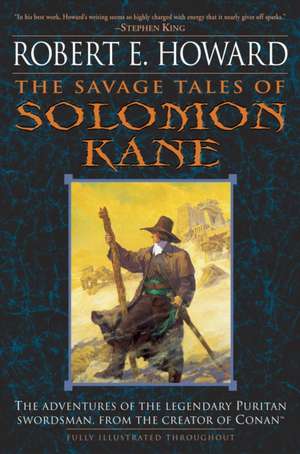



![The Black Phone [Movie Tie-in]: Stories](https://i3.books-express.ro/bt/9780063214835/the-black-phone-movie-tie-in.jpg)

